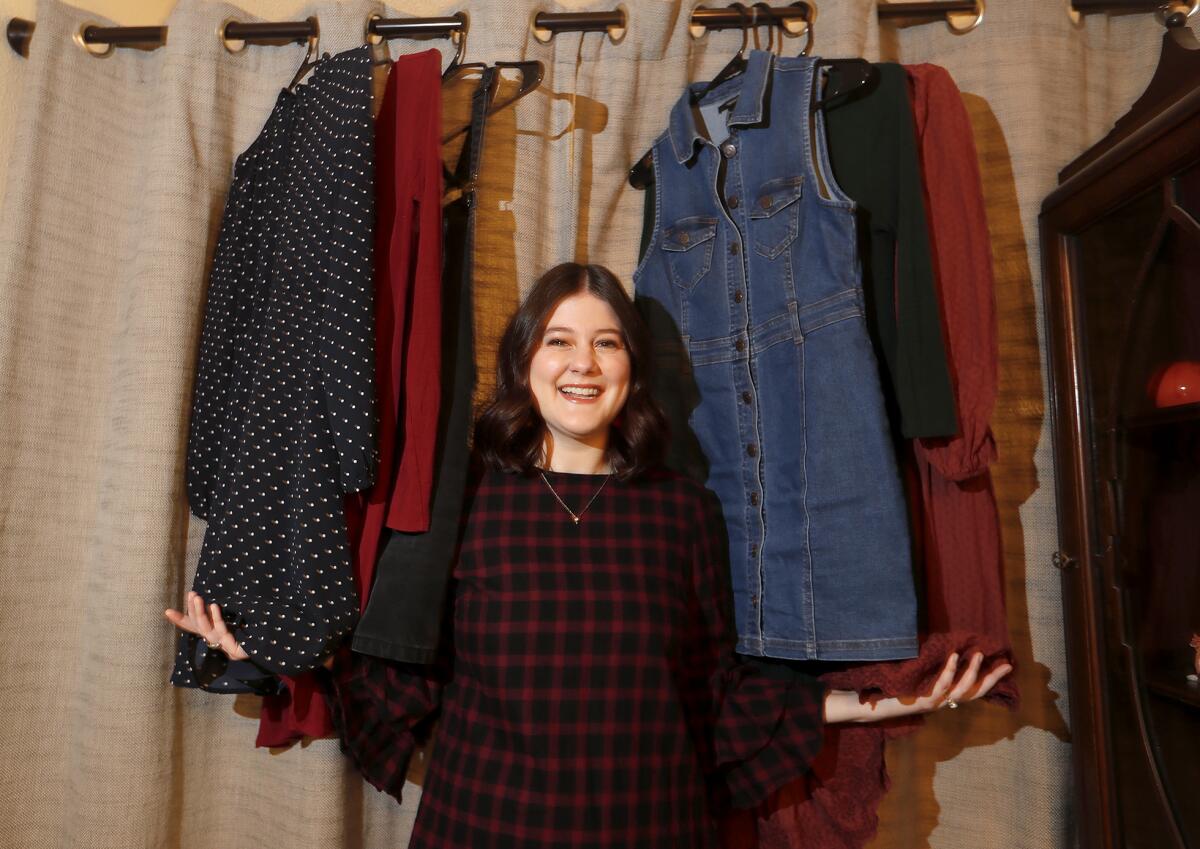Dressember has raised millions to fight human trafficking with its unique fundraising campaign

- Share via
Kinsey Huntting wasn’t sure she had the power to advocate for human trafficking survivors.
“I was a little hesitant at first,” said the Rancho Santa Margarita resident. “I was like, ‘What can I do? What do I know about advocating on behalf of people who have experienced this?’”
But in 2017, a friend invited her to join her in a pledge to wear a dress for the 31 days of December as part of the Dressember style challenge, it sounded like something she could handle.
“Also at the time, I was dealing with my own experience involving sexual abuse,” said Huntting. “This was also when the #MeToo movement really got its momentum going. The combination of having someone close to me ask if I wanted to participate and getting that boost of courage from all of these women coming forward and speaking their truth and sharing their stories, it really impacted me.”
Dressember is a 501(c)3 nonprofit that has raised over $13 million to support victims and survivors of human trafficking by resourcing prevention, advocacy, intervention and survivor empowerment programs simultaneously. It began in Orange County in 2009, when founder Blythe Hill challenged herself to wear a dress everyday in December. Since then thousands of participants, like Huntting, have taken up her cause.
Participants in the Dressember style challenge register on the Dressember website and create a campaign page to share with their network of family and friends. The funds raised on their individual pages, which are similar to those on the GoFundMe site, are then used to provide grants to anti-trafficking organizations, which are vetted by Dressember’s Grant Advisory Committee.
“We don’t just give general grants. It is very strategic,” said Marissa Marx, director of strategic partnerships at Dressember. “They tell us what they need most and how it fits with Dressembers funding priorities and our values.”
Huntting became an advocate in 2017 and has participated in the Dressember challenge each year since.
“It was really a cathartic experience for me because I had not yet found the courage to speak up myself,” said Huntting. “It was really awesome to see there was this huge community behind the Dressember movement, and I made tons of connections with a lot of people who were also doing Dressember. It was a really great experience and one of the reasons I continue to do it every single year.”
While the challenge might sound simple, Huntting said it isn’t always easy.
“Layering is a big thing,” Huntting laughs. “I live in fleece-lined tights in winter.”
After hearing some people express how they couldn’t participate because they didn’t own very many dresses, Huntting challenged herself to only wear seven dresses during this year’s campaign.
“I cycled the same seven dresses for the whole 31 days because I wanted to show people that it does seem really daunting at first, but once you get into the groove of it, it becomes a habit.”
Although December is over, Marx said Dressember encourages advocacy year round.
“Over the last few years we have developed a more consistent presence year round because there is so much to talk about,” said Marx.
The organization leans into Foster Care Awareness month in May and organizes a fundraising 5k run each spring. January is Human Trafficking Awareness month and Dressember has events planned for the month in order to raise awareness and debunk myths that surround human trafficking.

Huntting admits prior to her work with Dressember she didn’t know much about the human trafficking industry.
“I was just about as familiar with human trafficking as anyone who watched the movie, ‘Taken,’” said Huntting, “It is just kind of this sensationalized thing. The general public isn’t super familiar with the ins and out of the human trafficking industry.”
In reality, human trafficking happens on a much more intimate level, Marx said, and besides helping victims escape there is a need for trauma care afterwards.
“The majority of trafficking is familia trafficking, within the family, or what is known as boyfriend trafficking or loverboy trafficking, where a man or woman is grooming somebody with a very specific background that is quite vulnerable and quite desperate to make ends meet,” said Marx. “It is a very specific issue that is portrayed very different in the media. We don’t often hear of cases of kidnapping. There is less physical coercion and more psychological coercion.”
This month, the Dressember blog is presenting a series titled “Things Survivors Wish You Knew,” in which survivors share their personal stories.
Safety measures at the center include mask-wearing and a requirement that audience members provide proof of vaccination or a recent negative COVID-19 test.
“One of our priorities at Dressember is to better those most impacted by human trafficking, which are survivors of human trafficking and really passing the mic to them and learning from them,” said Marx. “One is published on the blog so far, from a survivor we have worked with a few times. It is very chilling, it is very real, it is very raw. Nobody from our team edited it — it is her story on there.”
More stories are slated for the rest of the month.
Another lesser known fact is human trafficking is prevalent in the foster care system, Marx said. One of the ways Dressember keeps its Orange County connection and provides wraparound care for survivors is by working with organizations like Olive Crest in Santa Ana.
“Olive Crest is considered one of our prevention partners,” said Marx. “They are our main foster care partner. They actually were selected in Orange County as the primary agency to provide treatment of commercial exploitation of children in Southern California.”
“About 60 percent of children that are caught up in human trafficking came from the child welfare system,” said Olive Crest Executive Director Annamarie Dachtler.
Dachtler said transition aged youth, which are children that turn 18 and age out of the foster care system, are the most vulnerable to human trafficking. Olive Crest serves Orange, Los Angeles and Riverside counties, and advocates for neglected and abused children. The organization’s work with Dressember zeros in on that at-risk population.
“Dressember comes in and supports us in that way because of the population we serve. They specifically focus on our transition-aged youth,” said Dachtler.
According to Dachtler, 4,000 kids age out of the system in California each year and of those 400 will become instantly homeless.
“Because they have no stability, no home or a safe place they are looking for those things,” said Dachtler. “Love, stability, care and usually that comes in the way of someone taking advantage of them. They don’t have relationships in their lives to keep them safe.”
Dachtler said partnerships with groups like Dressember are important for organizations like Olive Crest and for individuals too.
“Get involved with organizations that are stepping up and supporting foster care and doing something about it. Get involved with Dressember and organizations that are trying to bring awareness to this issue,” Dachtler said.
Huntting believes raising awareness can help bring an end to human trafficking for good.
“The more that people know, the more this can come to end. It is people recognizing the signs before it happens — or recognizing the signs while it is happening and can put a stop to it,” Huntting said.
She sees herself going for her sixth year of the Dressember style challenge next year.
“You never know what is gonna happen in the next year, but I like to think that I can continue to contribute to this cause.”
All the latest on Orange County from Orange County.
Get our free TimesOC newsletter.
You may occasionally receive promotional content from the Daily Pilot.





